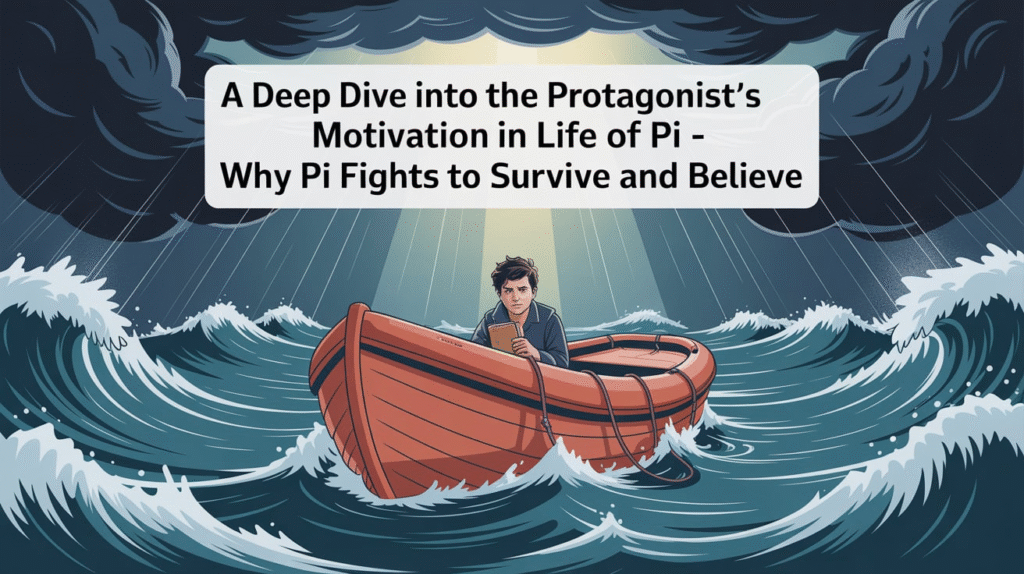The primary motivation driving Pi in Life of Pi is survival, both physical and spiritual. More than just a tale of endurance, Yann Martel’s novel presents Pi’s journey as a layered struggle to preserve life, purpose, and faith in an overwhelming and brutal universe.

This deep dive reveals how Pi’s motivations evolve, overlap, and ultimately define the story’s philosophical heart.
Pi’s Core Motivation is to Survive—But It’s Not Just About Staying Alive
At its most immediate level, Pi’s motivation is to stay alive after the shipwreck. But even this base instinct is driven by complex emotional and psychological layers.
Survival Through Practicality
- Pi adapts quickly, using his knowledge of animals and survival tactics to ration supplies, fish, and collect rainwater.
- His resourcefulness on the lifeboat is driven by a deep will to live, not just a fear of death.
Survival Through Ritual
- Even while stranded, Pi maintains religious rituals and routines, giving structure to chaos.
- These rituals serve not just spiritual needs but psychological survival—helping him retain identity and hope.
Faith Powers Pi’s Emotional and Spiritual Endurance
Beyond food and shelter, Pi’s true strength lies in his faith—which fuels his motivation to keep going when survival seems hopeless.
Multifaith Devotion
- Pi is a practitioner of Hinduism, Christianity, and Islam, finding value in each.
- His commitment to belief gives him emotional and moral strength, especially in isolation.
Believing to Stay Human
- Faith helps Pi maintain compassion, even for Richard Parker, and prevents him from becoming numb or animalistic.
- His desire to remain morally centered is as strong as his will to survive.
Fear and Isolation Shape Pi’s Motivation
Fear becomes both an obstacle and a motivator, pushing Pi to develop strategies and a mindset that ensure his survival.
The Fear of the Tiger
- Richard Parker is a constant threat and a motivator. Training the tiger gives Pi purpose and structure.
- This fear forces Pi to be alert, strategic, and mentally engaged.
The Fear of Losing Himself
- Beyond external dangers, Pi fears losing his humanity, his faith, and his mind.
- He continually motivates himself through storytelling, rituals, and introspection to prevent psychological collapse.
Pi’s Motivation Evolves as the Journey Progresses
Pi’s reasons for surviving shift over time—from sheer instinct to philosophical conviction.
From Shock to Strategy
- Initially, Pi is in survival mode, responding to immediate needs and dangers.
- As time passes, he becomes more philosophical, contemplating the nature of existence, suffering, and God.
From Isolation to Connection
- His bond with Richard Parker grows—not as friendship, but as a recognition of shared survival.
- The presence of the tiger gives Pi motivation to remain sane and disciplined.
Storytelling Becomes a Motivational Force
Narrative itself becomes a survival tool for Pi—both during and after his ordeal.
The Power of Imagination
- Pi creates and tells stories to make sense of horror, loss, and pain.
- This storytelling becomes a coping mechanism that allows him to live with trauma.
Story as a Moral Framework
- Pi’s final choice to offer two versions of his survival tale reflects his belief in the power of story over fact.
- He is motivated to choose a version of events that affirms life, love, and faith—even if it’s less “real.”
The Final Motivation: To Find Meaning in Suffering
In the end, Pi’s ultimate motivation transcends mere survival—it becomes a search for meaning.
Spiritual Reflection
- Pi reflects on his journey as a spiritual test—a way for God to reveal strength, faith, and truth.
- Even his suffering gains value through the lens of belief.
Emotional Reconciliation
- Surviving wasn’t enough—Pi needs to understand why he survived.
- His storytelling is part of this process, helping him—and the reader—find closure.
FAQ: Understanding the Protagonist’s Motivation in Life of Pi
Here are some questions and answers about Pi’s internal drive and how it shapes the novel’s message.
What motivates Pi to survive?
Initially, Pi is driven by the instinct to live, but he’s ultimately powered by faith, morality, and a refusal to surrender his humanity.
Why is faith so central to Pi’s journey?
Faith gives Pi emotional strength, structure, and hope. It helps him interpret suffering and gives him a reason to endure beyond physical survival.
Is Richard Parker Pi’s only motivation?
No, but the tiger plays a crucial role. Richard Parker keeps Pi focused, disciplined, and emotionally grounded. He symbolizes both fear and strength.
How does storytelling help Pi?
Storytelling allows Pi to process trauma, retain identity, and communicate his experience in a way that affirms meaning—even in suffering.
What is Pi searching for beyond survival?
Pi seeks truth, faith, and peace. His journey is as much about understanding life’s purpose as it is about escaping death.
Yann Martel’s Life of Pi isn’t just about surviving the ocean—it’s about surviving the emptiness, fear, and silence that follow loss. Pi’s motivation reveals the essence of resilience: not just staying alive, but finding reasons to live.
